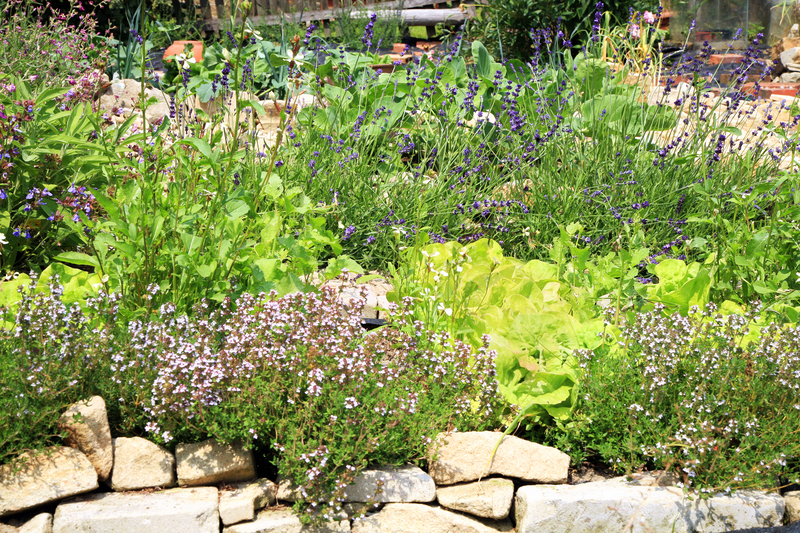Discover the essence of peace with Zen garden landscaping
Posted on 17/06/2025
Discover the Essence of Peace with Zen Garden Landscaping
If you're seeking tranquility, balance, and a touch of minimalist beauty for your outdoor spaces, you may want to explore Zen garden landscaping. With roots in centuries-old Japanese spiritual philosophy, Zen gardens offer more than just visually pleasing scenery--they are designed to cultivate mindfulness, harmony, and a serene state of mind. In this article, you'll discover the essentials of Zen garden design, key elements, and best practices to turn your home landscape into a sanctuary of peace.

The Philosophy Behind Zen Gardens
Zen gardens, often referred to as Japanese rock gardens or karesansui, are more than ornamental spaces. Their origins lie in the teachings of Zen Buddhism, emphasizing meditation, simplicity, and the beauty of natural imperfection, or wabi-sabi. These landscapes are intended as places for contemplation, crafted thoughtfully to evoke feelings of harmony and quietude.
- Simplicity: Minimalism in design, featuring a restrained selection of natural elements
- Balance: Artful arrangement of rocks, gravel, and plants
- Symbolism: Every element holds meaning--a rock may represent a mountain, water signifies calmness
- Mindfulness: Walking or meditating in a Zen garden cultivates presence and clarity
Why Choose Zen Garden Landscaping?
Modern living is often fast-paced and overstimulated. Zen garden landscaping offers a respite, transforming any space--large or small--into a retreat where the mind can rest and the senses can recharge. Whether you have a sprawling yard, a modest patio, or even just a balcony, the principles of Zen landscaping can be adapted to bring serenity and renewal.
Essential Elements of a Zen Garden
To truly embrace the peaceful essence of Zen landscaping, it helps to understand the traditional elements commonly found in these unique gardens. Each aspect plays a role in creating balance and conveying a deeper sense of tranquility.
1. Rocks and Stones
- Rocks create focal points and symbolize mountains or islands.
- Careful placement encourages contemplation and represents the passage of time.
- Choose stones with natural shapes and weathered textures for authenticity.
2. Sand or Gravel
- Sand or gravel is typically used to represent water or the empty space between elements.
- Raking patterns into sand symbolizes rippling water or flowing energy, enhancing the meditative quality.
- Select neutral colors--whites, greys, or natural earth tones--to keep the landscape cohesive.
3. Carefully Selected Plants
- Planting is minimal but meaningful--think moss, bamboo, dwarf pines, or maples.
- Plants signify perseverance and the cyclical nature of life within your Zen garden setting.
4. Water Features
- Features like still ponds or trickling fountains embody calmness and reflect the serenity found in traditional Zen landscapes.
- Water elements help muffle external noise, deepening the sense of seclusion and peace.
5. Bridges, Pathways, and Ornaments
- Stone pathways are arranged asymmetrically, guiding guests to meditate as they traverse the space.
- Lanterns or simple wooden benches can be added but never in excess--the mantra is "less is more."
Design Principles of a Peaceful Zen Garden Landscape
Creating a peaceful Zen garden isn't just about placing rocks and gravel--it's about capturing the spirit of tranquility. Here are some guiding philosophies for your design:
- Asymmetry: Avoid perfect symmetry. Nature is organic and unpredictable.
- Ma (?): This Japanese concept translates to "negative space," highlighting the importance of emptiness in design.
- Shakkei (Borrowed Scenery): Utilize views or existing landscape elements beyond your garden's confines to create depth and connection.
- Simplicity and Restraint: Choose a limited color palette and few plant species. Each addition should serve a clear purpose in the scene.
Inspirational Variations on Zen Garden Landscaping
While original Zen gardens may require significant space, you can adapt the core tenets for any outdoor or indoor area.
- Courtyard Zen Gardens: Perfect for urban dwellers, these miniature sanctuaries offer peaceful escapes amid city life.
- Balcony or Terrace Zen Gardens: Use containers, sand trays, and potted bamboo for an apartment-friendly version.
- Modern Zen-Inspired Gardens: Blend traditional materials with contemporary design elements for a unique, personalized space.
Step-by-Step Guide to Creating Your Own Zen Retreat
Ready to bring Zen-inspired landscaping to life in your backyard? Follow these expert steps to make a sanctuary that reflects peace and simplicity:
1. Select the Right Site
- Choose a spot that feels private, is shielded from noise, and receives balanced sunlight for plant health.
2. Plan the Layout
- Sketch your ideas, emphasizing the arrangement of rocks, empty spaces, and pathways.
- Think about sight lines and the journey--how will visitors experience the space?
3. Prepare the Foundation
- Clear the area of weeds and debris.
- Lay down landscape fabric to prevent future weed growth, then add a base layer of sand or gravel.
4. Place Major Elements
- Begin with large rocks or boulders. Arrange them in odd-number groups for a more natural look.
- Add gravel or sand around these focal points, using a rake to create meditative patterns.
5. Integrate Plants and Water
- Plant moss, dwarf shrubs, or bamboo sparingly but with intention.
- If space allows, install a pond, water basin, or a simple fountain as a calming centerpiece.
6. Add Final Touches
- Finish with a small stone lantern or wooden seat, but avoid crowding the garden with ornaments.
- Install subtle outdoor lighting to appreciate the garden at dusk or for nighttime meditation.
Maintaining Your Zen Garden: Keep the Calm Alive
The core of Zen landscaping is regular maintenance and mindful engagement. This is not just about aesthetics but about preserving the meditative qualities of the garden.
- Rake patterns in sand or gravel frequently to refresh the appearance and engage in moving meditation.
- Prune plants with care, striving for natural-looking shapes rather than rigid lines.
- Inspect rocks and features after storms or high winds, re-set as necessary.
- Clean water features and check for moss or algae buildup to keep the environment healthy and serene.
The Benefits of Zen Garden Landscaping
Investing time in creating a peaceful Zen garden landscape yields rewards far beyond curb appeal:
- Reduces stress: Being surrounded by balanced, calming design encourages relaxation and soothes the mind.
- Promotes mindfulness: Regularly tending to the garden or contemplating its design helps cultivate attentiveness and gratitude.
- Encourages outdoor living: Create a tranquil sanctuary for meditation, reading, yoga, or simply unwinding.
- Adds property value: Distinctive Zen-inspired landscaping boosts visual interest and uniqueness, making your home memorable.
Common Mistakes to Avoid in Zen Landscaping
Even the most beautiful Zen gardens can lose their tranquil essence if certain principles aren't respected:
- Avoid clutter: Never overcrowd with too many plants, ornaments, or colors.
- Overlooking symbolism: Every item should be chosen with purpose, aligned with Zen philosophy.
- Neglecting maintenance: Allowing weeds to creep in or letting water features stagnate can diminish the peaceful vibe.
- Ignoring negative space: Remember that "empty" areas are vital to the garden's balance and narrative.
Embrace the Tranquil Beauty of Zen Garden Landscaping Today
Whether you're seeking a soothing backyard oasis or a minimalist centerpiece for your patio, Zen garden landscaping provides a powerful way to connect with nature and foster inner peace. By integrating ancient principles with your personal style, you can create a space that inspires reflection, calmness, and a deeper sense of well-being every day.
Begin your journey now and discover the essence of peace with Zen garden landscaping--your home, mind, and soul will thank you for it.

Frequently Asked Questions about Zen Garden Landscaping
What are the main features of a Zen garden?
The main features include rocks, gravel or sand, minimalistic plants, water features, and carefully chosen ornaments or pathways, all arranged to embody tranquility and simplicity.
Is a Zen garden suitable for small spaces?
Absolutely! Zen gardens can be scaled to any size. Even a small balcony or a corner of your yard can be transformed into a peaceful retreat with strategic use of rocks, sand, and container plants.
How much maintenance do Zen gardens require?
Zen gardens are relatively low-maintenance compared to traditional gardens, but regular raking, pruning, and cleaning are essential to sustain their meditative ambiance and beauty.
Can I personalize my Zen garden design?
Of course--while classic elements dominate, feel free to inject your personality through unique rocks, locally-sourced plants, or artistic touches that still align with the principles of Zen landscaping.
Conclusion: Let Your Zen Garden Be Your Sanctuary
A Zen garden is more than just a landscape--it's a physical space that invites quietude, reflection, and a deeper connection to the natural world each day. By honoring its key elements, design philosophies, and ongoing care, your garden will serve as a lasting source of peace and inspiration, no matter the pace of modern life. If you're ready to embrace clarity, calmness, and balance, let Zen landscaping guide your way to discover the essence of peace right outside your door.
Latest Posts
Shielding Your Garden from Excessive Wind Blasts
Harnessing Heights for Horticulture: Vertical Gardens
Container gardening: Growing bounties in limited spaces
Blissful Backyards: Unlock the Secrets to Stunning Garden Seating Areas

